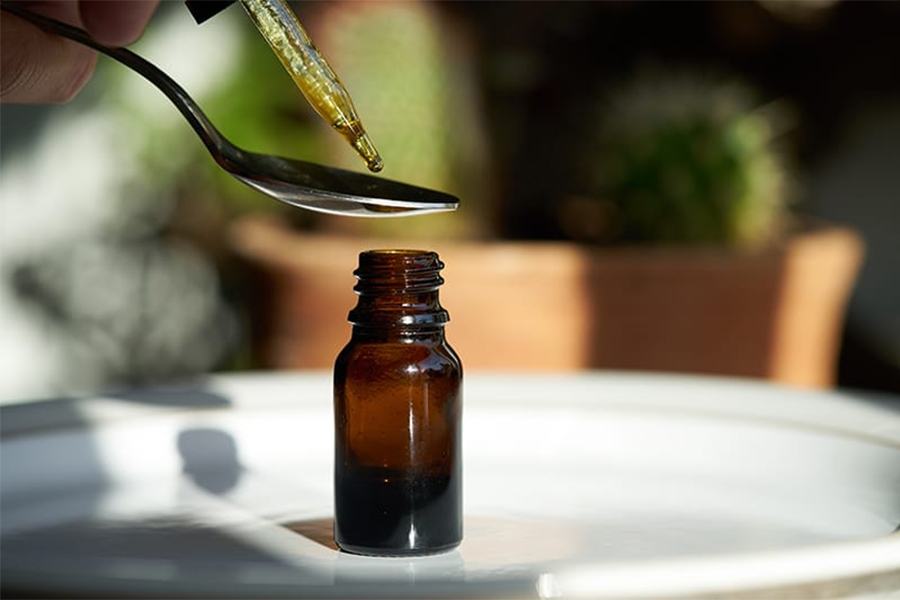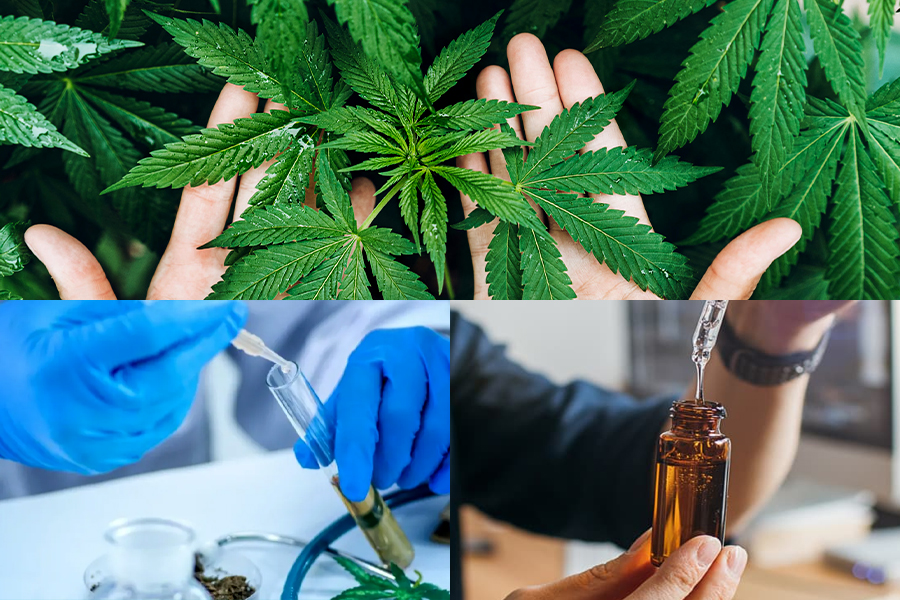People have been using CBD oil for IBS for a while. Irritable Bowel Syndrome or IBS is a persistent condition that can make it complicated for people to live their lives comfortably, as the symptoms may appear at any time. Statistics say that at least one in ten people presents symptoms of IBS.
However, even if this illness is relatively common in today’s society, it has not been investigated well enough, making it complicated to find a cure that is 100% effective for it. This condition attacks the digestive system and is characterized by causing constant abdominal pain, which causes the bearer to be uncomfortable throughout their days.
At the moment, there are tons of new treatment options that you can consider as an alternative that can help you cope with the symptoms. CBD is one of the many alternative remedies that have become quite popular today. This article will explain everything you need to know regarding the use of CBD oil for IBS.
We’ll describe the benefits and potential side effects. Before we start, please note that you should always consult with a medical professional before you submit yourself to a new treatment.
What is CBD Oil?
Cannabidiol or CBD is one of the many compounds found in the cannabis plant. It has gained popularity over the years due to its excellent properties, which can help treat diverse health conditions. According to recent studies, CBD can be helpful for people who struggle with irritable bowel symptoms.
CBD oil can be found in different presentations, including edibles (like gummies). There are three types of CBD in the market, which are the following:
Full-Spectrum CBD
This CBD variation contains all the compounds found in hemp plants, including THC, which is responsible for the intoxicating effect. However, the percentage of THC in full-spectrum CBD is limited to less than 0.3%.
Broad-Spectrum CBD
This CBD type contains all the compounds found in hemp plants, except THC. It still has the same healing properties, but some people believe it has a reduced potency compared to full-spectrum CBD.
CBD Isolates
As the name suggests, a CBD isolate only contains CBD and no other compound of the cannabis plant.
Regardless of your choice, studies have suggested that CBD has several benefits for our general health, including anti-inflammatory properties, relaxation, and even a more powerful immune system. Some of these properties can also be beneficial for IBS.
What is IBS?
Irritable Bowel Syndrome, commonly known as IBS, is a gastrointestinal condition. The main symptom is abdominal pain, which causes continuous discomfort to the bearer. Besides abdominal pain, other symptoms that people with IBS commonly have may include the following:
- Pain and cramping
- Diarrhea or constipation (depending on the condition, there might be periods of constipation and diarrhea from one period to another)
- Bowel movement variations
- Intolerance of certain foods
- Anxiety and depression
Although anxiety and depression aren’t directly linked to IBS, a study found that people with IBS are more likely to experience mental distress, which makes them more vulnerable to mental conditions, specifically mood disorders. Furthermore, another study found that patients with IBS experience more fluctuations in their cortisol levels, the stress hormone.
Therefore, it may be possible for them to experience higher levels of stress. This way, we can say that IBS is a condition that affects both the physique and mind of the bearer, making it almost impossible to lead a normal and pleasant life without proper treatment.
Since there isn’t a cure for IBS at the moment and research is still in its early stages, many people take into account alternative medicines to cope with the symptoms and lead a normal lifestyle. That’s why many people have opted for using CBD in recent years.
Can CBD Oil Help with IBS?
Some of the common treatments for IBS include a healthy diet and leading a less stressful lifestyle. However, most people like to use alternative medicines to help them during flare-up periods. Although there are many medications, the remedies available at the moment often include many side effects that may relieve some symptoms but cause completely different ones.
That’s why many people prefer using CBD. CBD interacts with the cannabinoid receptors found in the human body (endocannabinoid system), which are also present in the digestive system. Therefore, ingesting CBD can help with certain digestive problems. Cannabinoids travel throughout the body, triggering diverse beneficial effects during the process.
However, please note that CBD does not provide stimulation to the CB1 and CB2 receptors, which are responsible for the “euphoric” effect associated with cannabis. At the same time, this highness is caused by THC, which is only present in CBD products at less than 0.3%. Certain studies suggest that CBD has anti-inflammatory effects, which can help with the abdominal pain caused by IBS.
A recent study from 2020 also suggested that CBD may have therapeutical benefits for IBS and similar conditions. Please note that although our current evidence looks promising, research is still in its early stages. Hence, we cannot say whether IBS truly helps with IBS nor even cure it. It can help cope with certain symptoms, but it will not make them disappear.
The National Centers for Complementary and Integrative Health has also published a study on CBD. According to their evidence, CBD could be beneficial for people struggling with inflammatory bowel disease. Still, the institution says that more evidence is required to confirm the effects of CBD on IBS.
Benefits of CBD Oil for IBS
As we mentioned in the previous section, diverse studies have been conducted regarding the effects of CBD on IBS:
Anti-Inflammatory Properties
Many studies have been published regarding the anti-inflammatory effects of CBD for multiple conditions. Again, there is not enough evidence, but early research suggests that CBD could be helpful in relieving inflammatory pain, including the discomfort that comes from IBS and similar conditions.
CBD for Gastrointestinal Conditions
IBS patients and people who struggle with other conditions have also started to take CBD, thanks to the potential it has as a mucosal defense system in the gut. This mucosa is essential when it comes to coping with IBS. In addition, CBD is known to decrease the appetite and may also help you with anandamide deficiency.
The compound is also known to help with digestive muscle movements and cramping. Keep in mind that, again, there is not enough evidence regarding how CBD can affect the gastrointestinal tract of the human body. However, all the evidence gathered at the moment suggests very positive results.
How to Use CBD Oil for IBS?
As we’ve mentioned in previous sections, CBD works best for IBS when ingested. However, this medicine is available in different presentations. You should follow the instructions printed on the label of the specific medicine you have to make sure you’re using it correctly. You can also consult with your doctor or any other medical professional about the use of CBD for IBS so you can get more information.
With that being said, here are some of the various forms of CBD for IBS there are available:
CBD Oils: CBD oils can be ingested, taken sublingually or topically. It’s the most common form of CBD and is available in most stores if not all. The absorption is relatively quick, from 1 to 2 hours, depending on how you take it.
CBD Capsules: CBD Capsules that contain CBD oil can also be found. You can ingest them as you would take any other pill, allowing you to obtain all the benefits of cannabidiol.
CBD Topicals: There are creams, balms, and other topical products available that you can use on your skin, allowing you to feel relief in the affected areas.
CBD Edibles: There are CBD edibles available, like gummies. It makes CBD consumption a bit more entertaining while also allowing you to obtain all the benefits associated with the compound.
How Much CBD Oil Should You Take for IBS?
The CBD oil dosage for IBS varies depending on the medicine you have at hand. Most of the time, manufacturers will print clear instructions on how to use their CBD products, including the right dosage, how to use it, and other useful information for the user.
Therefore, we highly recommend you read the whole box or label to make sure that you’re using your CBD product as you should. Another fact you should keep in mind if you’re considering CBD oil for IBS is that none of these products are regulated by the Food and Drug Administration (FDA). That’s why there isn’t a particular dosage established, and it’s up to the user to decide how much CBD to take.
Which Type of CBD Oil is Best for IBS?
We’ve mentioned above that you can choose between full-spectrum, broad-spectrum, and CBD isolates. However, the truth is that it is up to you to choose the one that works better for you. Some people prefer using full-spectrum CBD because it contains all the compounds found in the C. Sativa plant.
Other people prefer broad-spectrum, and CBD isolates because these products don’t contain THC; therefore, there is no risk of intoxication or “highness.” Still, keep in mind that it’s almost impossible for CBD to cause the euphoric effect associated with THC.
So, when it comes to the form of CBD you should choose, there are plenty of options. You can choose oil as we’re describing in this article, but you can also opt for using capsules and even suppositories.
How to Choose Quality CBD Products?
If you truly want to make sure that the CBD product you’re choosing is the best one, there are a few things you should take into account:
- The THC levels should not be higher than 0.3%.
- The company should provide third-party lab testing proof.
- It should also provide proof of testing for pesticides, mold, and other harmful substances, like microbes and even heavy metals.
- The product should also go through tests for potency and safety.
- All the tests should not come from companies that have received warning letters from the FDA.
- All the CBD products you choose should come from a company that has all the information mentioned above available to the public.
Here are some other factors you should take into account while choosing high-quality CBD products:
Hemp Source: Where does the company get its hemp from? The source of the plant is a crucial factor in the quality of the final product.
Third-Party Testing: As mentioned above, third-party testing lets you know all the components and substances present in the CBD product you’re using. This way, you can confirm if the product is safe for your consumption.
Avoid Fake Claims: Make sure to research the company you’re purchasing from very well. It’s a very common practice to make false claims about their products. Keep in mind that CBD does NOT cure any illness or condition.
Type of CBD Oil: As mentioned above, you can choose between full-spectrum CBD (which contains THC) and broad-spectrum or CBD isolates (both options don’t contain CBD). Hence, the latter options could be safer for beginners, although most full-spectrum CBD products are safe for most people.
Potency: The dosage is different depending on the product. Expensive CBD products usually have high potency, but it depends on the brand and its overall content of it.
Side Effects of CBD Oil
CBD oil is not known to cause severe side effects on the user. One of the most common worries in people is that they’ll get high if they use CBD, but that’s completely false. Here are some of the most common effects of CBD:
- A feeling of exhaustion or fatigue
- Appetite and weight fluctuations
- In rare cases, some people may present diarrhea.
CBD can cause diarrhea, but only in specific individuals. There is no research available regarding the exact cause of this. Hence, it’s necessary to take this medicine with precaution. Experts recommend taking CBD along with a meal high in fat to reduce the risk of side effects. It’s also worth mentioning that CBD may interact with certain medicines. Hence, make sure to talk with your physician before you start taking CBD.
Conclusion
Diverse studies show promising suggestions regarding the use of CBD for IBS. It has anti-inflammatory and relaxing effects that can help the bearer lead a calmer and less stressful lifestyle in the long run. However, it may not be the best solution for everyone.
Besides CBD, we also recommend you to follow the FODMAP diet, which consists in avoiding or reducing the number of sugars that could trigger intestinal distress, and, therefore, worsen the symptoms of IBS. Again, please remember to consult with your physician before you start taking any new medication.
Frequently Asked Questions
How Fast Does CBD Oil Work for IBS?
It depends on how you take it. Sublingual CBD products may start taking effect after 15 minutes, but edibles and topical products may take one or two hours to trigger the effect finally.
Does CBD Oil Help with Bowel Movements?
Some studies have found that CBD oil could be helpful for digestive muscle movements and cramping. Therefore, it could be excellent for those who struggle with inflammation due to IBS.
Can CBD Oil Hurt Your Stomach?
CBD oil will not hurt your stomach. However, in rare cases, some people have reported experiencing diarrhea, which is why taking the compound with precaution is recommended to avoid potential side effects.
Can You Put CBD Oil on Your Belly Button?
You can, but that doesn’t mean that your body will absorb the compound through it. No research suggests that rubbing CBD oil on your belly button is helpful for absorption.






Leave a Reply